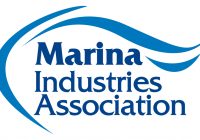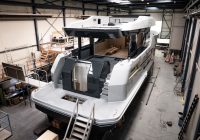It’s not every day you meet someone with an unwavering passion for their job quite like Reef Authority Project Manager Ryan Ramasamy.
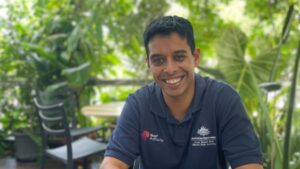
Ryan sports a smile on his face and a twinkle in his eyes as he talks about his love for fish, recounting stories from the earliest days of his marine science career.
A world away from his young life in Singapore, it was Ryan’s father’s career in the Air Force that first introduced him to sunny-skied Queensland.
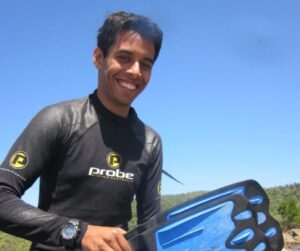
But from the concrete jungle of Singapore to the rolling hills and flowerbeds of Toowoomba in Southern Queensland, Ryan’s love for the ocean was far from experiential.
“I was a kid who grew up in Singapore and Toowoomba, so I didn’t have an accessible ocean; my inspiration came from visiting zoos and always being attracted to animal exhibits,” Ryan said.
“Toowoomba was in a drought, so I don’t think the dam even had water in it when I was a kid!”
Ryan’s family migrated from Singapore to Australia when he was nine years old.
A smart and clued-on kid, Ryan knew he wanted to know more about the world he lived in.
“Going through high school I thought I was going to do research. I was always questioning the things I heard, so I could see myself at a university,” Ryan said.
It wasn’t until he discovered the Great Barrier Reef that his passion was ignited.
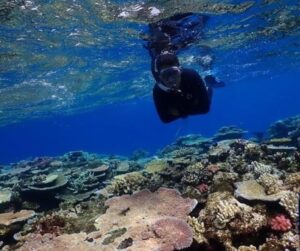
“My first time on the Reef was a family holiday in the Whitsundays. I can still picture it clear as day, the first time I put my head underwater – the fish, the colours, the movement.
“That’s probably when I truly thought ‘this is what I want to do for the rest of my life’,” Ryan said.
Dreaming in technicolour, Ryan was hooked.
“It was a complete opposite to my upbringing; my dad was a pilot. In Singapore, you kind of follow your parents’ footsteps. I was the weird kid who said, ‘I don’t want to go up I want to go down; I want to see the fish’,” he said.
It wasn’t all rosy for Ryan however, with the challenge of tertiary education posing a potential roadblock.
“In truth, I almost left university after six months because of the four subjects I was taking, I failed one and passed the other three – one of which was a pass by the skin of my teeth.
“But I was lucky enough to have amazing lecturers that believed in me and gave me the advice I needed to get back on track,” he said.
By the final year of his undergraduate degree, Ryan had more questions than answers; and was taken with life underwater.
He wanted to be the first in the world to discover ‘something’ about fish, so Ryan’s mind was set on a career in research.
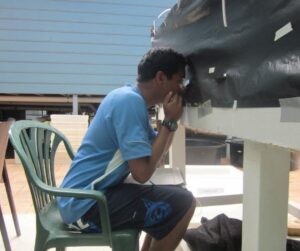
First, Ryan would need to take to the skies to complete his mandatory conscription in the Air Force in Singapore.
“I was in the Air Force for two years and once I finished that, I moved back to Townsville to do my masters,” Ryan said.
Starting with a Postgraduate Diploma, Ryan then completed a Master of Philosophy, authoring seven scientific papers and making his discovery about fish.
“During my research, I discovered that baby fish that live in dangerous habitats will change the way they behave for life, based off their first four days of life on a reef,” Ryan said.
With an impressive paper tail, Ryan was living his life-long dream of being a researcher.
However, all of this was about to change as Ryan discovered something new about himself.
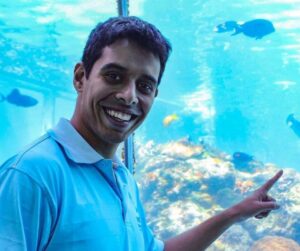
“While I was doing my masters, a friend of mine asked if I wanted to become a volunteer at Reef HQ (known now as the Great Barrier Reef Aquarium).
“At that time, I went ‘oh okay, I’ll come just to find out stuff about the volunteering’.
“After my volunteer’s course, I ended up doing a weekly shift every Friday morning and I slowly started finding this side of me I didn’t know existed, being able to share my passion for the Reef with everyday people.
“Shortly after becoming a volunteer, I took up a casual position. I was a guide, diver, an aquarist, manned functions and served people food. I just pretty much did everything you could do at the aquarium,” he said.
After finishing his master’s degree, Ryan was offered a full-time position at the aquarium in Reef Education.
“I got to do some of the coolest things ever in my career. We went for a dive in the predator tank with a camera. I wore a full-face mask with a microphone and headphones and did a live video classroom to kids all over the world.
“You’d be having a conversation while underwater with kids in Europe, South Korea, America, New Zealand.
“It would all be in real time. Kids would be asking questions about what they’re seeing, and I could answer straight away.
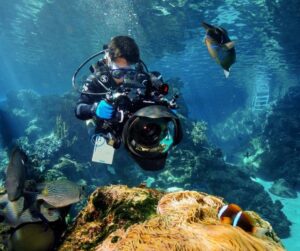
“Working here, you’re allowed the opportunity to have a taste of the different flavours of Reef management. One of the amazing things I love about my career is the fact that I have helped educate so many people.
“Fiona Merida gave me my first shot out of Reef Education to run the Eye on the Reef program at the Reef Authority. I got to travel up and down the Great Barrier Reef to see amazing sites, and teach tourism operators to complete Reef health surveys and understand the Reef around them so they could pass their knowledge onto guests.
“Some of the tourism staff I taught are now Master Reef Guides,” Ryan said.
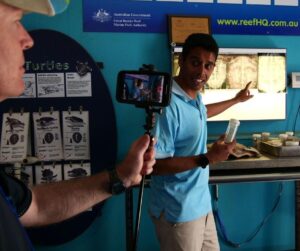
Now a Project Manager for the Reef Outlook Report, Ryan’s work is focussed on helping scientists and government paint a clearer picture of the health of the Reef.
“I’m one of the writers of the next Outlook Report: a once in five-year report of the condition of the Reef, not just focusing on corals, but the different habitats, species, businesses that rely on Reef, the uses of the reef.
“It’s a detailed, comprehensive report that gets handed to the Federal Minister for Environment.
“I’m with an organisation that truly can make a difference, because we are the managers of the Reef,” he said.
Despite Ryan’s tenure at the Reef Authority, you still see his eyes light up as he learns something new.
“In my 10 years at the Reef Authority, I’ve learned the world is your oyster. You can do so many things to make a difference in this world.
“It doesn’t have to be the one thing for the rest of your life. You’ve got one life to do as many things as you can.
“Go and experience the amazing things you can do in your career. Go and volunteer. You won’t truly understand what it is to be in this field until you experience it. You won’t read it in a book.
You need to experience it first-hand,” he said.
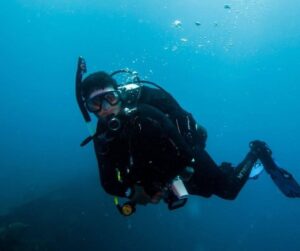
From the team at www2.gbrmpa.gov.au









